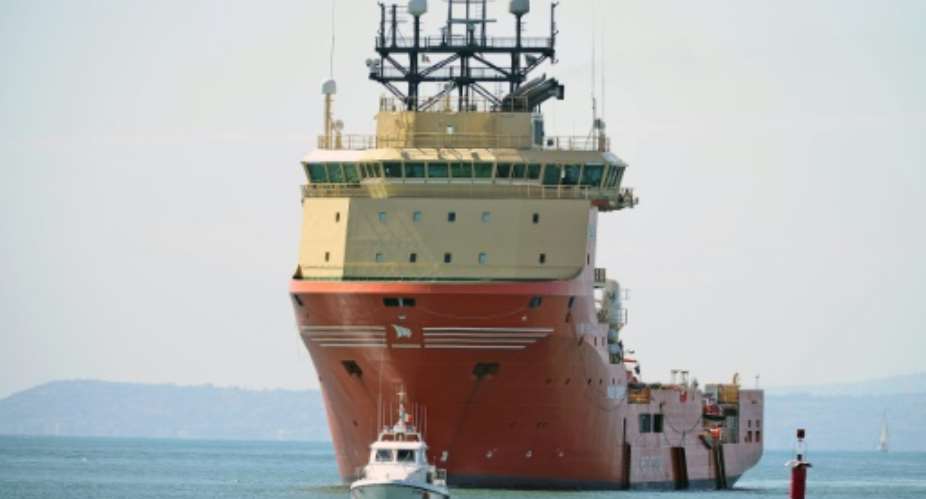A bord du Siem Pilot (AFP) - Pal Erik Teigen had to make a tough call Saturday: sail a rescue ship away from desperate migrants in waters off the Libyan coast in order to safeguard the lives of others.
The drama began at around 8 pm, 20 nautical miles off Libya, as rescuers were transferring migrants onto the Siem Pilot, a vessel built as an oil platform supply ship but now used by the EU border force Frontex in its Mediterranean rescue operations.
The migrants were being transferred from a tanker with over 900 people on board, said Teigen, a Norwegian police officer in command of operations on the Siem Pilot.
At around 3 am, the crew spotted a number of dark rubber boats coming towards the Siem Pilot.
"We followed them with the search lights and as the sun rose, we saw a total of 12 rubber boats," he said.
Some of the more distant migrants were rescued by other military or civilian boats, including medical charity Doctors Without Borders' Dignity 1, whose crew could do nothing for some 10 people who fell into the sea before it arrived.
"We had four (rubber dinghies) close to the Siem Pilot. We transferred some of (the people on) them to the Siem Pilot until we reached the limit of capacity," Teigen said, adding however that everyone was given a life vest and that if anybody had been in imminent danger they could have been taken on board immediately.
But then one of the dinghies began to motor towards the Siem Pilot.
Following instructions from the crew, the boat stopped a little way off, but then the people on board began jumping into the water.
It was then that Teigen took the decision to sail away, confident that "everybody had their life vest, so we knew they would float".
"The main reason to move the Siem Pilot was to keep the other people inside the boat," said Teigen, adding that this also gave room for other small craft to go to the migrants' rescue.
"The small (rescue) boats picked up the 24 (people) that had jumped into the water and took them over to the tanker. We stabilised the situation and everything was quiet after that and nobody drowned," he said.
Baby born
Others were not so fortunate.
The Siem Pilot has a refrigerated container where the bodies of 17 migrants who died from suffocation, dehydration, hypothermia or simple exhaustion are now stored.
The night's rescue operations were also complicated by the arrival of aggressive people smugglers determined to recover their dinghies.
"For us, when we do the rescue, the most important thing is to rescue the people first. And then we could try to catch or take hold of the facilitators (smugglers). Their boat headed away once we began sailing for Palermo" with 1,093 people on board, said Teigen.
"To have so many people on the boat is difficult. But those on the boat are taken good care of. They get blankets, they get food and they get water. We have a doctor and nurses and we have a medical room to use when necessary," he said.
Along with the over 1,000 people rescued, one extra arrived in Palermo.
During the night, a baby boy was also born, prematurely at 1.25 kg (2.75 pounds), and later taken ashore on the Italian island of Lampedusa.
"That was the first time we have had a baby born on the Siem Pilot," said Teigen.





 Dumsor: Don't rush to demand timetable; the problem may be temporary — Atik Moha...
Dumsor: Don't rush to demand timetable; the problem may be temporary — Atik Moha...
 Space X Starlink’s satellite broadband approved in Ghana — NCA
Space X Starlink’s satellite broadband approved in Ghana — NCA
 2024 election will be decided on the grounds of the economy; choice of running m...
2024 election will be decided on the grounds of the economy; choice of running m...
 Dumsor: We're demanding less; just give us a timetable — Kwesi Pratt to ECG
Dumsor: We're demanding less; just give us a timetable — Kwesi Pratt to ECG
 Do I have to apologise for doing my security work, I won’t – Simon Osei-Mensah r...
Do I have to apologise for doing my security work, I won’t – Simon Osei-Mensah r...
 All my businesses have collapsed under Akufo-Addo — NDC Central regional chair
All my businesses have collapsed under Akufo-Addo — NDC Central regional chair
 Military, Prison Officers clash in Bawku, three injured
Military, Prison Officers clash in Bawku, three injured
 GRA-SML contract: MFWA files RTI request demanding KPMG report
GRA-SML contract: MFWA files RTI request demanding KPMG report
 Court threatens to call second accused to testify if NDC's Ofosu Ampofo fails to...
Court threatens to call second accused to testify if NDC's Ofosu Ampofo fails to...
 Family accuses hospital of medical negligence, extortion in death of 17-year-old...
Family accuses hospital of medical negligence, extortion in death of 17-year-old...
